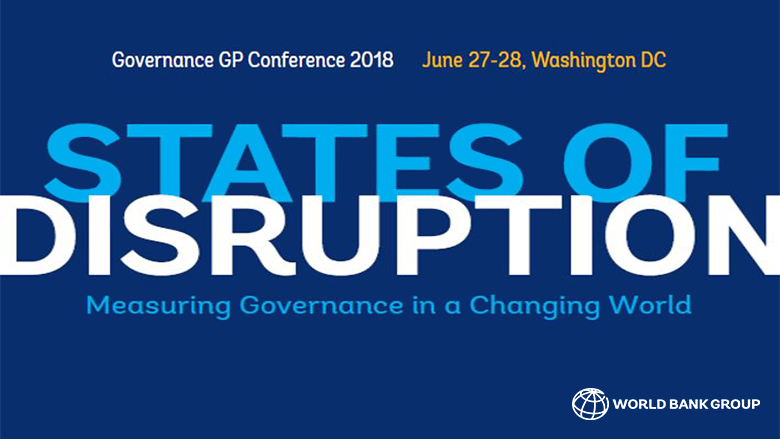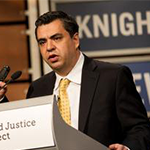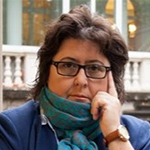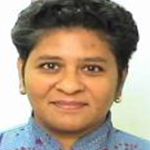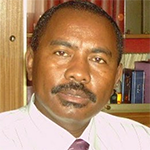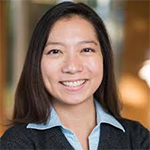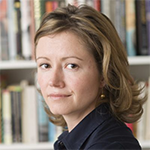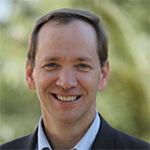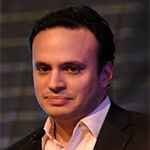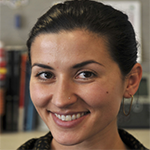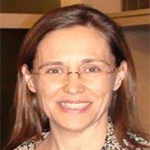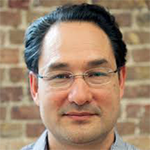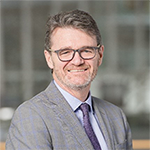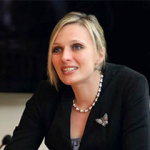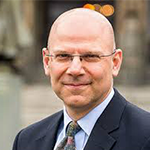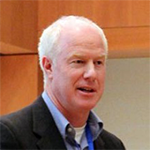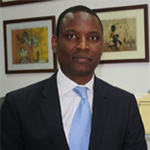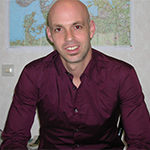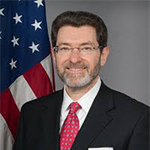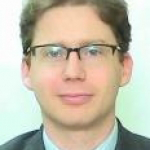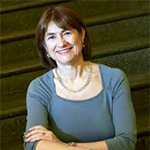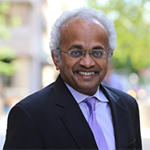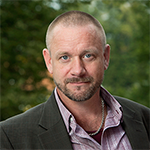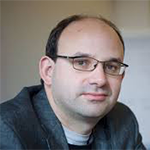| Deborah WetzelSenior Director, Governance Global Practice, World Bank Deborah Wetzel, a U.S. national with more than 25 years of experience in development work around the world, is the World Bank Senior Director for Governance since April 4, 2016. Ms. Wetzel was previously Director of Strategy and Operations for the Middle East and North Africa Region and prior to that served as Country Director for Brazil, from March 2012 until July 2015. Ms. Wetzel was the World Bank Group’s Chief of Staff to the World Bank President from 2010 to 2012. She has also served as Director for Governance and Public Sector, directing the Bank's work on taxation, public expenditures, decentralization, public sector reform and strengthening, governance and anti-corruption. From 2006 to 2009, she led the World Bank’s Economic and Public Sector Programs in Brazil, based in Brasilia. During that period she developed numerous programs with state and federal governments to help improve the effectiveness of public expenditures and achieve better results. Ms. Wetzel began her career at the World Bank in 1986 as a Consultant, joining the Young Professionals Program in 1993. She also worked at the Centre for the Study of African Economies in Oxford England in the early 1990s. During her career, she has worked in Central and Eastern Europe, Ghana, Hungary, Ukraine, Vietnam, Russia, the former Soviet Republics, West Africa and Zambia. Ms. Wetzel has a Doctorate in Economics from the University of Oxford and a Masters in International Studies from Johns Hopkins University, School of Advanced International Studies. Her BA is from Smith College. She is the author of publications on fiscal decentralization, public finance, governance, and sub-national affairs. |
| Alejandro Ponce Chief Research Officer, World Justice Project Dr. Alejandro Ponce is the Chief Research Officer of the World Justice Project. He joined the WJP as Senior Economist and is one of the original designers and a lead author of the WJP Rule of Law Index. Dr. Ponce leads the research and data collection initiatives of the World Justice Project, from the administration of the WJP Rule of Law Index to the design and implementation of nationwide surveys in Afghanistan, Pakistan, the EU, and Mexico.Prior to joining the World Justice Project, Dr. Ponce worked as a researcher at Yale University and as an economist at the World Bank and the Mexican Banking and Securities Commission. Dr. Ponce has conducted research in the areas of behavioral economics, financial inclusion, justice indicators, and the rule of law, and has been published in collected volumes as well as top academic journals such as the American Economic Review and the Journal of Law and Economics. He is a frequent speaker in international conferences and policy forums in the area of rule of law. He holds a B.A. in Economics from ITAM in Mexico, and a M.A. and Ph.D. in Economics from Stanford University. |
|
| Alina Mungiu-Pippidi Professor of Democracy Studies, Hertie School of Governance Alina Mungiu-Pippidi is Professor of Democracy Studies at the Hertie School of Governance in Berlin. Her research centres on anti-corruption policy and good governance. Mungiu-Pippidi chairs the European Research Centre for Anti-Corruption and State-Building (ERCAS) where she managed the FP7 research project ANTICORRP, and currently the Horizon 2020 project DIGIWHIST. Her governance work is cited and applied by a string of development organisations, by some EU governments and the European Commission. Mungiu-Pippidi has recieved the Harvard University Shorenstein Fellowship, an Open Society Institute Fellowship, a Fulbright Fellowship and the Jean Monnet Fellowship of the European University Institute. She is President of the Romanian Academic Society (SAR) and founder of the social media watchdog platform Clean Romania! (romaniacurata.ro). She studied political science at Harvard University after completing a PhD in Social Psychology in 1995 at the Alexandru Ioan Cuza University of Iaşi in Romania. |
|
| Amy Deora Director of Government Analytics Amy leads a Washington-DC based team at Civis Analytics, providing consulting and software solutions to state, local, and federal clients. Amy has more than 15 years of experience leading large data integration and analytics projects for both the private and public sectors. Prior to joining Civis, Amy served as Director of Applied Statistics at Summit Consulting, where she spent nearly ten years working with clients at the Department of Labor, the Department of Energy, the US Treasury, and the FHA to use predictive analytics and other new approaches from data science to improve their operations. Amy recently led a large, multi-year engagement providing health claims data analysis, staff training, and the custom development of analysis tools designed for investigators of employer-provided health plans for the Department of Labor. Amy holds an M.S. in City Planning for the Massachusetts Institute of Technology (MIT). |
|
| Andrew Laing Public Economics Practice Manager, Institute for State Effectiveness Andrew Laing is the Public Economics Practice Manager and Public Financial Management Lead for Afghanistan at Institute of State Effectiveness. |
| Asmeen Khan Practice Manager, Governance Global Practice, World Bank Asmeen Khan is currently Practice Manager, Strategy and Operations, in the Governance Global Practice. Asmeen has worked for over 25 years on topics related to local governance, decentralization, social accountability, community driven development in South and East Asia, based in the Thailand, India and Indonesia Field Offices. Prior to joining the Bank, Asmeen worked for the Ford Foundation and Oxfam. |
|
| Bali Andrianteseheno General Coordinator, Program of Reforms for the Efficiency of Administration, Republic of Madagascar |
|
| Bernard Myers Senior Public Sector Specialist, Governance Global Practice, World Bank Bernard Myers is a Senior Public Sector Management Specialist at the World Bank Kuala Lumpur office, where he leads the work on public finance management. Before moving to Malaysia in January 2017, Bernard leads the Bank’s public sector team in Indonesia, helping manage engagements on budget management, tax administration, and accountability at the central government. Prior to his work in Southeast Asia, Bernard spent several years supporting countries in Europe and Central Asia, where his areas of specialization included public investment management, performance based budgeting, budget planning, budget execution, civil service reform, and functional reviews of the public administration performance. Currently, Bernard is the Facilitator for the Budget Community of Practice within the Public Expenditure Management Network in Asia (PEMNA), which is a peer-to-peer network for budget officials in east Asia. Bernard is a US national, and before joining the Bank in 2000, he worked as an overseas budget advisor for the US Treasury’s Office of Technical Assistance and as a senior evaluator for the US Government Accountability Office (GAO) on federal budgeting issues. Bernard holds an MBA from Stanford Business School and a bachelor’s degree in Political Economy from Princeton University. |
|
| Cesi Cruz Assistant Professor, University of British Columbia Cesi Cruz is assistant professor at the University of British Columbia. |
|
| Clare Lockhart Director and Co-Founder, Institute for State Effectiveness | Senior Fellow, Jackson Institute for Global Affairs, Yale University Clare Lockhart is Director and co-Founder of the Institute for State Effectiveness (ISE), which seeks to address the challenge of accountability and governance through a system-building approach across governments, markets and citizens. She served in Afghanistan as an adviser to the UN during the Bonn Process and to the Afghan Government from 2001 to 2005, and has worked in several countries across Europe, Asia and Africa. She is co-author with Ashraf Ghani of Fixing Failed States and contributes to the media on issues of security, peace-building and development. Lockhart was named by Foreign Policy Magazine as one of the “100 Most Influential Global Thinkers” of 2009 and 2010 for her work on fragile states. She was nominated as a Young Global Leader in 2011 by the World Economic Forum, and serves as a Trustee of the Asia Foundation. |
|
| David Eaves Lecturer, Harvard Kennedy School A public policy entrepreneur, open government activist and negotiation expert, David is a Lecturer of Public Policy at the Harvard Kennedy School of Government. At HKS, he teaches on digital transformation, service delivery, open government and open data. David is also a co-founder of ReCollect Systems, a company that provides software services to hundreds of municipalities and is used by tens of millions of residents. |
|
| David McAfee Chief Executive Officer, Viamo |
|
| Ed Olowo-Okere Director, Governance Global Practice, World Bank Ed Olowo-Okere is currently the Director of World Bank Group’s Governance Global Practice responsible for Africa, Middle East and North Africa, and Europe and Central Asia. In that capacity, he oversees governance strategies, programs and staff in these regions. Also, he is the Head of the Bank’s Financial Management Family, which comprises staff working on the fiduciary (financial management) aspects of all Bank operations as well as lending and technical assistance on financial management in public and private sectors across the regions. He leads the Bank’s engagement with global partners on financial management and related themes. Ed had previously held the following positions at the World Bank: Senior Adviser, Equitable Growth, Finance and Institutions Vice-Presidency Unit; Chief Strategy Officer, Governance Global Practice; Director of Operations Services, Africa Region; and Regional Manager for Financial Management, Africa Region. His experience in development work includes preparation of sectoral and regional strategy, operational policy reforms, knowledge management, operations quality and portfolio management, project preparation and implementation support in all sectors, and policy dialogues with and technical assistance to clients on a wide range of themes, including public financial management, private sector accounting & auditing, public procurement, environmental and social safeguards compliance, and monitoring and evaluation. Prior to joining the Bank in 1998, Ed worked in Nigeria, Britain and New Zealand. Ed holds a Bachelor of Science (First Class Honors) Degree in Accountancy from the University of Maiduguri and a Masters Degree in Accounting (with Distinctions) from the University of Lagos, Nigeria as well as a Ph.D. in Management (with specialization in Change Management and Public Financial Management) from the University of Bath, United Kingdom. He is a Fellow of the Institute of Chartered Accountants of Nigeria (ICAN). He has researched, published in reputable international journals and lectured at undergraduate and graduate levels in Nigeria and New Zealand on accounting and finance. Also, he has won several academic and merit awards. |
|
| Edouard Al-Dahdah Senior Public Sector Specialist, World Bank Edouard has worked at the World Bank since 2001, first in the Middle East and North Africa (MENA) Unit, then at the World Bank Institute, where he worked on governance and anticorruption diagnostics and empirics, and led the Political Economy team. From 2012 to 2015, he was the Senior Governance Specialist for Egypt, Yemen and Saudi Arabia, based in Cairo. He is the lead author of “Rules on Paper, Rules in Practice: Enforcing Laws in the Middle East and North Africa” (2016), and “Better Governance in the Middle East and North Africa” (2003), among other publications. He did his graduate work at the University of Chicago and Georgetown University, and his undergraduate work at the American University of Beirut. |
|
| Eric Meerkamper Global Head of Citizen Engagement, RIWI Eric Meerkamper is the Global Head of Citizen Engagement at RIWI Corp., where he structures global data partnerships and strategic alignments with multilateral organizations, governments, universities, think tanks, and civil society organizations around the world. He frequently speaks on leveraging innovation in citizen-generated data for increasing global social and development impact. Initiatives spanning over 100 countries and 100 million respondents include gathering citizen opinion towards: Open Government (www.openinggovernment.com), Syrian refugees social cohesion in Turkey, global LGBTI rights, Ebola and Zika virus, income inequality, tax morale, and CVE message testing in closed societies and conflict areas. Mr. Meerkamper has over 25 years experience in global insights generation and emerging technologies, including previously as President of one of the world’s first companies to develop and apply online research methodologies. He holds an honors degree in International Political Science from the University of Western Ontario and an MBA from the Ivey Business School. He is the co-founder and past Chair of the Centre for Social Innovation in Toronto and New York City. |
| Erik Wibbels Robert O. Keohane Professor of Political Science, Duke University Erik Wibbels is the Robert O. Keohane professor of political science at Duke University and the co-general editor of the Cambridge Studies in Comparative Politics series. His research focuses on development, redistribution and political geography and has been published by Cambridge University Press, World Politics, International Organization, American Journal of Political Science, American Political Science Review and other journals. He also works with bilateral and multilateral donors to improve the design and evaluation of governance programming and is a founding member of the DevLab@Duke. Current major projects include an attempt to combine surveys and satellite imagery to identify slums in India and understand the conditions under which residents achieve formal recognition and successfully attract public services; an impact evaluation of a large, district-level governance program in Ghana; and work on how the geographic emergence and spread of state authority impact long-term economic development at the local level. |
|
| Evagelia Emily Tavoulareas Adjunct Professor, Columbia University Evagelia Emily Tavoulareas has worked at the intersection of technology and social impact for nearly a decade with a clear goal: to improve the lives of people. From working with young social entrepreneurs in Saudi Arabia, to mapping the refugee process and helping the Department of Veterans Affairs better understand the needs of Veterans and their families, her career has been spent focused on figuring out what people need and how to provide it to them. Tavoulareas is a Founding Member of the first agency-level team of the U.S. Digital Service, where she focuses on technology policy, product management, and service design. |
|
| Femi Oke International Journalist Femi Oke is an international journalist, writer and moderator. Since the 1980s, she has worked for BBC television and radio, Sky TV, all U.K. terrestrial television networks, CNN and U.S. public radio. Oke’s reporting has been recognized by the Economic Community of West African States (ECOWAS), the African Communications Agency and InterAction. You can connect with her anytime via Twitter @FemiOke. |
|
| Francesca Recanatini Lead Public Sector Specialist, World Bank Francesca has worked on governance, integrity and corruption since the beginning of her career working at the Center of Institutional Reforms and Informal Sector (IRIS) in College Park. Throughout her career she has focused on integrating issues of governance and integrity in institutional development and growth. Francesca joined the World Bank in 1998 and currently leads the Anti-corruption Thematic Group, providing guidance on anti-corruption issues and institutions of accountability. She coordinates the work on governance and anti-corruption diagnostic tools in several countries in Latin America and Africa, completing more than half dozen reports that have translated in country-specific strategies. She manages the Actionable Governance Indicators work and has recently launched the initiative on effectiveness of Anti-Corruption Authorities. She has published several papers on corruption and poor governance, contributing recently to the Global Handbook on Research and Practice in Corruption, Adam Graycar, editor (January 2012); and to the International Handbook on the Economics of Corruption, Susan Rose-Akerman and Tina Soreide, eds. (December 2011). She is a Member of the EU Group of Experts on Corruption and holds a Ph.D in Economics from the University of Maryland at College Park. |
|
| Fredrik Galtung President and Co-Founder, Integrity Action Fredrik Galtung was the Founder President of Integrity Action, a London-based international NGO that he co-founded with Jeremy Pope in 2003 to help communities fix public projects and services. Integrity Action is a pioneer in Open Beneficiary Feedback. Integrity Action's Community Integrity Building approach has helped people monitor - and fix - hundreds of projects affecting millions of people across more than a dozen countries. Fredrik stepped down from Integrity Action in May 2018. Fredrik Galtung is re-defining anti- corruption work from top-down finger pointing to bottom-up promotion of integrity at the community level. He has advised ten heads of state and government in Africa, Asia and Latin America, national agencies in Europe, as well as the Council of Europe, the Global Fund to Fight Aids, TB, and Malaria, OECD, UNDP, Unicef, UN Office of Drugs and Crime, UN Secretariat, World Bank, corporations, large foundations and numerous civil society organisations. |
|
| James (Jim) Brumby Director, Governance Global Practice, World Bank Jim Brumby is a Director of the Governance Global Practice, and is responsible for the governance program in the East Asia & Pacific, Latin America and the Caribbean and the South Asia regions. He also heads the public sector family which comprises staff working on domestic resource mobilization, public economics, justice and public sector reform. Jim has been engaged on public management and economic reform at state, national and international levels for more than thirty years, having worked for the Treasury of the state of Victoria in Australia, the Treasury of New Zealand, the OECD, the IMF and currently since 2007, at the World Bank. He returned to World Bank headquarters in Washington DC in 2015 to take up the position of Director after a period in Indonesia as Lead Economist and Sector Manager. He holds an MPA from Harvard University. |
|
| Jana Kurnicova Senior Public Sector Specialist, Governance Global Practice, World Bank Jana Kunicová is a Senior Public Sector Specialist at the World Bank. In her current assignment, she manages the Public Sector Performance outbound knowledge program at the World Bank’s Global Knowledge and Research Hub, Kuala Lumpur, Malaysia. Since joining the Bank in 2006, Jana has worked on improving public sector performance (including issues of service delivery, strategic planning, monitoring and evaluation, civil service, and public administration reform); integrity and anti-corruption systems; and political economy analysis. Jana’s regional experience spans the Europe and Central Asia and East Asia and Pacific regions, as well as several countries in southern Africa. She has managed lending operations, developed strategies, and prepared analytical products in a variety of settings: middle income countries (Malaysia, Ukraine, Albania, Caucasus, Turkey, Western Balkans), low income and/or fragile states (Tajikistan, Bosnia, Kosovo), and high income countries, where she helped design and implement reimbursable advisory services (Czech Republic, South Africa, Botswana). Jana holds a PhD in politica |
|
| Joel Hellman Dean, School of Foreign Service, Georgetown University Dr. Joel Hellman is the current Dean at the School of Foreign Service at Georgetown University. Prior to his role as the School’s Dean, Dr. Hellman served as the Chief Institutional Economist at the World Bank and was previously involved in leading its engagement with fragile and conflict-affected states as Director of the Center on Conflict, Security and Development in Nairobi, Kenya. Before this position, he was Manager, Governance and Public Sector Group, South Asia Region, in New Delhi. He coordinated the Bank’s response to complex global challenges while serving as a development practitioner. Prior to the World Bank, Dr. Hellman acted as the Senior Political Counselor at the European Bank of Reconstruction and Development in the United Kingdom.Dr. Hellman is a graduate of Williams College, where he majored in Area Studies. He has a Ph.D. in political science from Columbia University and an M.Phil. from the University of Oxford in Russian and East European Studies. |
|
| Liz McGrath Director of Research & Data, Natural Resource Governance Institute Based in London, Liz oversaw NRGI’s Resource Governance Index (RGI). Liz oversees major organizational research, data and analysis, provide oversight on our data strategy and projects. She previously worked for the Mo Ibrahim Foundation and most recently served for five years as the director of the Ibrahim Index of African Governance (IIAG), an annually produced statistical assessment of the quality of governance in all 54 African countries. Prior to joining the Mo Ibrahim Foundation, Liz worked for Amnesty International UK and the British Foreign & Commonwealth Office, as well as with national human rights organizations in Lagos, Nigeria, and Bogotá, Colombia. Liz grew up in Ghana and holds B.Sc. and M.A. degrees in economics and international development from the University of Bath and SOAS University of London. |
|
| Michael Woolcock Lead Social Scientist, Development Research Group, World Bank Michael Woolcock is Lead Social Scientist in the World Bank's Development Research Group, where he was worked since 1998. For twelve years he has also been a (part-time) Lecturer in Public Policy at Harvard University's Kennedy School of Government. His current research focuses on strategies for enhancing state capability for implementation, on crafting more effective interaction between informal and formal justice systems, and on using mixed methods to assess the effectiveness of "complex" development interventions. In addition to more than 75 journal articles and book chapters, he is the co-author or co-editor of ten books, including Contesting Development: Participatory Projects and Local Conflict Dynamics in Indonesia (with Patrick Barron and Rachael Diprose; Yale University Press 2011), which was a co-recipient of the 2012 best book prize by the American Sociological Association's section on international development, and, most recently, Building State Capability: Evidence, Analysis, Action (with Matt Andrews and Lant Pritchett; Oxford University Press 2017). He has recently returned from 18 months in Malaysia, where he helped establish the World Bank’s first Global Knowledge and Research Hub. An Australian national, he completed his undergraduate studies at the University of Queensland, and has an MA and PhD in sociology from Brown University. |
|
| Moustapha Ndiaye Senior Advisor, Governance Global Practice, World Bank Mr. Ahmadou Moustapha Ndiaye is Senior Advisor in the Governance Global Practice at The World Bank. He brings with him 28 years of professional experience in the private sector and international development, spanning more than 40 countries in Africa, Latin America and the Caribbean, as well as Eastern Europe and Central Asia. Previously, Moustapha was the World Bank Country Director for the Democratic Republic of Congo (DRC), the Republic of Congo, and Central African Republic as well as Coordinating Director for Regional Integration for Central, Eastern and Southern Africa. In this position, he managed a portfolio of about US$ 7 billion, and led the policy dialog with countries’ and regional organizations authorities. Moustapha joined the World Bank in 1998 as a Financial Management Specialist and has since served in different capacities, including on operational policies; as Regional Manager, Financial Management, for Europe and Central Asia Region where he oversaw financial management aspects in operations financed by the World Bank as well as capacity building activities in the areas of both public and private sector financial management; and Country Manager in Uganda where he led the World Bank policy dialog with the Government and stakeholders, and the implementation of the World Bank assistance strategy. Mr. Ndiaye holds a Masters in Finance and Accounting and a Masters in Business Administration. He graduated from Ecole Supérieure de Commerce de Paris (now ESCP Europe) in France. He is also a CPA. |
|
| Nathaniel Heller Executive Vice President, Integrated Strategies, Results for Development (R4D) Mr. Heller co-founded and led Global Integrity, a nonprofit organization that promotes government transparency and accountability worldwide. As executive director, he led the organization from its founding in 2005 through a period of intensive growth that saw Global Integrity established as an international leader on anti-corruption and governance issues. In addition to developing innovative methodologies for measuring public sector integrity systems in this nascent field, Mr. Heller designed and established the OpenGov Hub, the world’s first open government-themed co-working community with locations in Washington, DC and Kathmandu. He also created an emerging markets research company servicing consulting firms and hedge funds (Foglamp Research) that was spun off from Global Integrity in 2013, and a software-as-a-service research platform, Indaba, that was sold in 2015. Mr. Heller also served at the U.S. Department of State and focused on European political and military affairs; as a fellow at the Center for Public Integrity reporting on public sector accountability and ethics; and as a foreign policy fellow for Senator Edward Kennedy. He is currently a civil society co-chair and steering committee member of the Open Government Partnership and serves on the boards of Development Gateway, The Engine Room, and Feedback Labs. Mr. Heller holds a master’s degree from Georgetown University’s School of Foreign Service and a BA in international relations and Spanish literature from the University of Delaware. He is fluent in English and Spanish. |
|
| Nicholas Charron Associate Professor of Political Science, Gothenburg University Nicholas Charron is currently an Associate Professor in the Department of Political Science at the University of Gothenburg, as well as a research fellow at the Quality of Government Institute in Gothenburg, Sweden. |
|
| Ambassador Norm Eisen Senior Fellow – Governance Studies, Brookings Institution Ambassador Norman L. Eisen is a senior fellow in Governance Studies at Brookings, a CNN political commentator, and the chair of the government watchdog group CREW, which he co-founded in 2003. Eisen served from January 2009 to January 2011 in the White House as special counsel and special assistant to the president for ethics and government reform. Following his service in the White House, Eisen was the U.S. Ambassador to the Czech Republic from 2011 to 2014. He helped develop innovative anti-corruption and transparency strategies in cooperation with U.S. and Czech law enforcement and other stakeholders. Eisen received his J.D. from Harvard Law School in 1991 and his B.A. from Brown University in 1985, both with honors. |
|
| Renaud Seligmann Practice Manager, Governance Global Practice, World Bank Renaud Seligmann is currently Manager of the West and Central Africa Financial Management Unit at the World Bank. He oversees the Bank's involvement in public financial management, private sector accounting and auditing and operational financial management services for West and Central Africa. A French national, Renaud started his career as a financial judge at the Court of Accounts, the French Supreme Audit Institution. His focus was on aggregate fiscal risk in the public sector, performance budgeting and public sector reforms. He had a special interest in the health sector, leading financial and performance audits of cancer services, bio-terrorism and blood transfusion. He then became Deputy director of external audit at the United Nations Board of Auditors, where he led the first UN-wide audit of the response to the South Asian tsunami and was in charge of the audit of the UN Secretariat, UNICEF and other funds and programs, before joining the World Bank. He was based in Pretoria, South Africa and Washington, DC. Renaud holds a BA (hons.) in philosophy, politics and economics from Oxford University, a Master's Degree in political sociology from Sorbonne-Paris I University and a Master's in public policy from the Paris Institute of Political Studies (Sciences-Po). He is also a graduate from the French National School for Administration executive leadership program. Renaud is on the faculty of the Harvard Kennedy School of Government’s “Public Financial Management in a Changing World” executive education course. |
|
| Sally Engle Merry Silver Professor of Anthropology, NYU College of Arts and Sciences Sally Engle Merry is Silver Professor of Anthropology at New York University. She is also a Faculty Director of the Center for Human Rights and Global Justice at the New York University School of Law, and past president of the American Ethnological Society. Her recent books include Colonizing Hawai‘i (Princeton, 2000), Human Rights and Gender Violence (Chicago, 2006), Gender Violence: A Cultural Perspective (Blackwell, 2009) and The Practice of Human Rights, (co-edited with Mark Goodale; Cambridge, 2007). Her most recent book, The Seductions of Quantification: Measuring Human Rights, Gender Violence, and Sex Trafficking (Chicago: University of Chicago Press, 2016) examines indicators as a technology of knowledge used for human rights monitoring and global governance. She has co-edited two books on quantification, The Quiet Power of Indicators, with Kevin Davis and Benedict Kingsbury (Cambridge University Press, 2015) and A World of Indicators, with Richard Rottenburg, Song-Joon Park, and Johanna Mugler (Cambridge University Press 2015). She is the author or editor of fifteen books and special journal issues. She received the Hurst Prize for Colonizing Hawai‘i in 2002, the Kalven Prize for scholarly contributions to sociolegal scholarship in 2007, and the J.I. Staley Prize for Human Rights and Gender Violence in 2010. In 2013 she received an honorary degree from McGill School of Law and was the focus of an Author Colloquium at the Center for Interdisciplinary Research (ZIF) at the University of Bielefeld, Germany. She is an Honorary Professor at Australian National University. |
|
| Shanta Devarajan Senior Director, Development Economics, World Bank Shanta Devarajan is the Senior Director for Development Economics (DEC) and Acting Chief Economist of the World Bank Group. Previously, he was the Chief Economist of the World Bank’s Middle East and North Africa Region. Since joining the World Bank in 1991, he has been a Principal Economist and Research Manager for Public Economics in the Development Research Group, and the Chief Economist of the Human Development Network, the South Asia Region and Africa Region. He was a director of the World Development Report 2004, Making Services Work for Poor People. Before 1991, he was on the faculty of Harvard University’s John F. Kennedy School of Government. A member of the Overseas Development Institute’s Board of Trustees, and the author or co-author of more than 100 publications, Mr. Devarajan’s research covers public economics, trade policy, natural resources and the environment, and general equilibrium modeling of developing countries. Born in Sri Lanka, Mr. Devarajan received his B.A. in mathematics from Princeton University and his Ph.D. in economics from the University of California, Berkeley. |
|
| Shirley Held Partner, Cognitive & AI Practice, IBM Public Service Shirley Held is a Partner with the IBM Public Service Cognitive & AI Practice based in New York, NY. In this role, Shirley works with public service clients to drive business transformation through the use of advanced analytics and cognitive technologies. Prior to this role, Shirley worked as a senior strategy consultant for IBM internal Enterprise Transformation organization and applied advanced analytics to transform our own business, in the areas of HR, Sales & Marketing and key business initiatives. Shirley has 20 years of professional experience and is specialized in C-Suite Strategy Consulting, Enterprise Transformation through Advanced Analytics, Machine Learning, Artificial Intelligence, Business Development, Complex Project Delivery and Program Management. Shirley joined IBM in 1995. She holds a Bachelor of Science in Electrical Engineering from Shanghai University. Outside of work, Shirley enjoys spending time with her family, traveling and digital photography. |
|
| Staffan Lindberg Director, V-Dem Institute | Professor, Department of Political Science, University of Gothenburg Staffan I. Lindberg was recently promoted to Professor at the Department of Political Science, University of Gothenburg and is Principal Investigator for Varieties of Democracy (V-Dem) and manages the V-Dem Institute. Lindberg holds a doctorate from the Department of Political Science from Lund University in Sweden. His dissertation won the American Political Science Association’s Juan Linz Prize for Best Dissertation in 2005. Staffan I. Lindberg is Senior Advisor and Research Professor at ILPI and is affiliated to ILPI Centre for African Studies. Professor Lindberg has taught at Kent State University (2005-2006) and at University of Florida (2006-2013). In addition, he has spent two years in Ghana, as a parliamentary advisor and resident officer on Parliamentarians for Global Action’s West Africa program to support governance and institution building in legislatures. Lindberg consults on a regular basis for donors in Africa. In his capacity as V-Dem Principal Investigator, he also works on predictive modelling of transitions to and from democracy. |
|
| Steve Knack Lead Economist, Development Research Group Stephen Knack is a Lead Economist in the Development Research Group (Human Development and Public Services Team). His recent research addresses the impact of aid on policy reform and on public sector capacity and accountability. He is a specialist on actionable governance indicators for monitoring progress of public sector reforms, and has oversight responsibility for the public sector management and governance items in the Bank's annual Country Policy and Institutional Assessments. Prior to joining the Bank in 1999, Knack was a Research Associate at the University of Maryland's IRIS Center, and Assistant Professor in the School of Public Affairs at American University. He received a PhD in Economics from the University of Maryland in 1991. |
|
| Tom Steinberg Digital Transformation Lead, Big Lottery Fund/Founder, mySociety Tom Steinberg is someone who cares a lot about how digital technologies are used to advance the public interest, and worries a lot about this being done badly. He is a former CEO who specialises in helping current leaders develop clear strategies. He is the founder of mySociety, a citizen-empowerment NGO running websites like TheyWorkForYou.com and WhatDoTheyKnow.com. Steinberg writes on a range of issues relating to power, technology and government. He is currently the Digital Transformation Lead at the Big Lottery Fund. |
|
| Yuen Yuen Ang Associate Professor of Political Science, University of Michigan Yuen Yuen Ang is Associate Professor of Political Science at the University of Michigan, and Faculty Associate at the Lieberthal-Rogel Center for Chinese Studies and the Center for Complex Systems. Ang studies the political economy of development, adaptation, and public sector innovation, particularly in developing countries and non-democracies. Her book How China Escaped the Poverty Trap (Cornell University Press, Series in Political Economy, 2016), won the 2017 Peter Katzenstein Book Prize for “outstanding book in international relations, comparative politics, or political economy.” Currently, she is writing a second book on unbundling corruption, supported by the Smith Richardson Foundation. |
